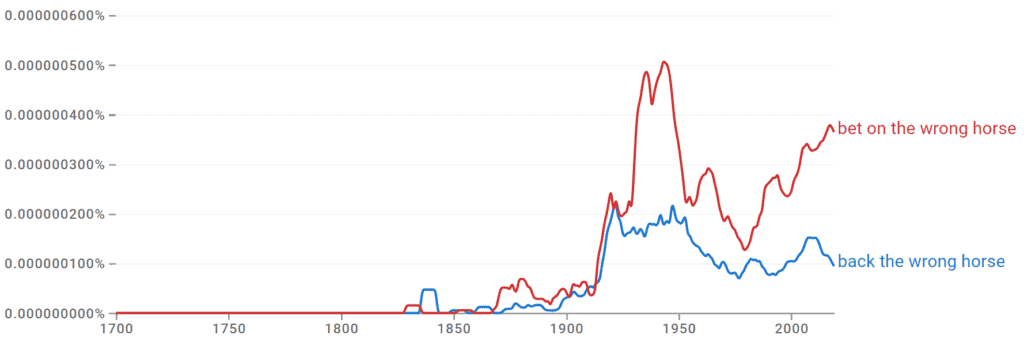Understanding idiomatic expressions like backing the wrong horse can help enhance your language skills and enrich your conversations and writing. But what does it mean to back the wrong horse, and how should you use it correctly? I’ve got all the answers you need right here! I’ll even toss in some sentence examples.
Bet on the Wrong Horse or Back the Wrong Horse?

Both back the wrong horse and bet on the wrong horse share the same meaning and can be used in place of one another in almost any context. These phrases are meant to be metaphoric expressions from the world of horse racing, where betting on the outcome is a significant aspect.
Meaning of Backing the Wrong Horse

To back the wrong horse means to make a wrong choice or to support a person or action that ends up failing or losing. We often use the phrase to convey a level of regret or hindsight about a failed plan or decision.
It’s like when I bought stock in Crunchyroll instead of Netflix when the two platforms first launched. Sure, Crunchyroll is popular today, but nowhere near that of Netflix. So, you could say, “I bet on the wrong horse.”
Origin and Etymology of Backing the Wrong Horse

The idiom back the wrong horse starts from the world of horse racing and wagering on horses in the early 1800s, where spectators would place bets or back the horse they believed would win the race. If the horse lost, they had essentially backed the wrong horse.
After the peak of horse racing back in the day, it didn’t take long for this phrase to be used metaphorically in other contexts to describe any bad decision.
Synonyms for Back the Wrong Horse
Here are some synonyms to add some variety when using this phrase.
- Made a wrong decision
- Took the wrong side
- Chose the wrong option
- Made a poor choice
- Made a bad bet
- Took a wrong turn
- Went down the wrong path
Backing the Wrong Horse: Examples in a Sentence

- Investing all his savings in the failing business, Adam realized he’d backed the wrong horse.
- We backed the wrong horse when we chose the new software vendor, and the project was a disaster.
- Most people backed the wrong horse during the elections, and their candidate lost.
- Choosing to ignore the weather forecast, we backed the wrong horse and got rained during our picnic.
- Listen, if you think you can get away without studying for the exam, I’m afraid you’re backing the wrong horse.
- My dad backed the wrong horse by investing in the real estate market just before it crashed.
- I think we backed the wrong horse when we bought plastic lawn furniture instead of metal.
Don’t Put the Horse Before the Cart
The idiom backing the wrong horse is a fun way to express your regret about a bad decision. Adding it to your vocabulary can help you describe complex situations and decisions in a simple, relatable way for others. Remember, we all back the wrong horse at times; it’s what we learn from it that counts.
Want to know more idioms? Check out the following articles below:
